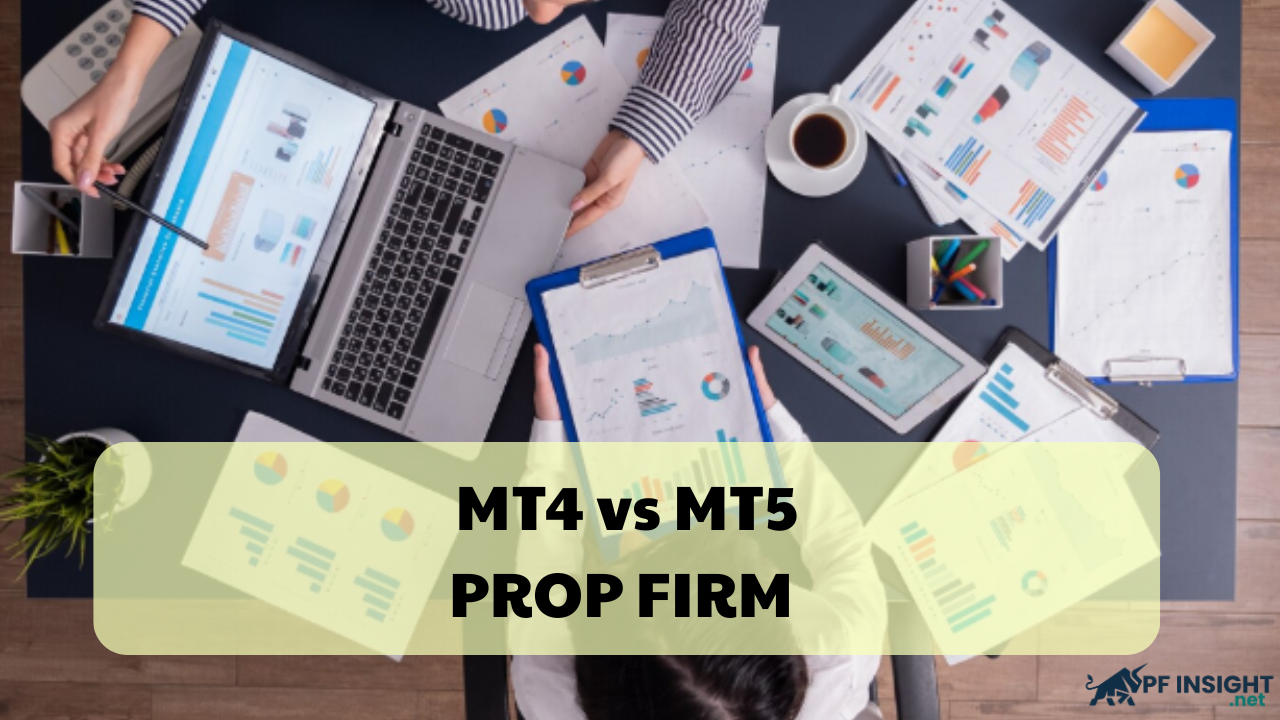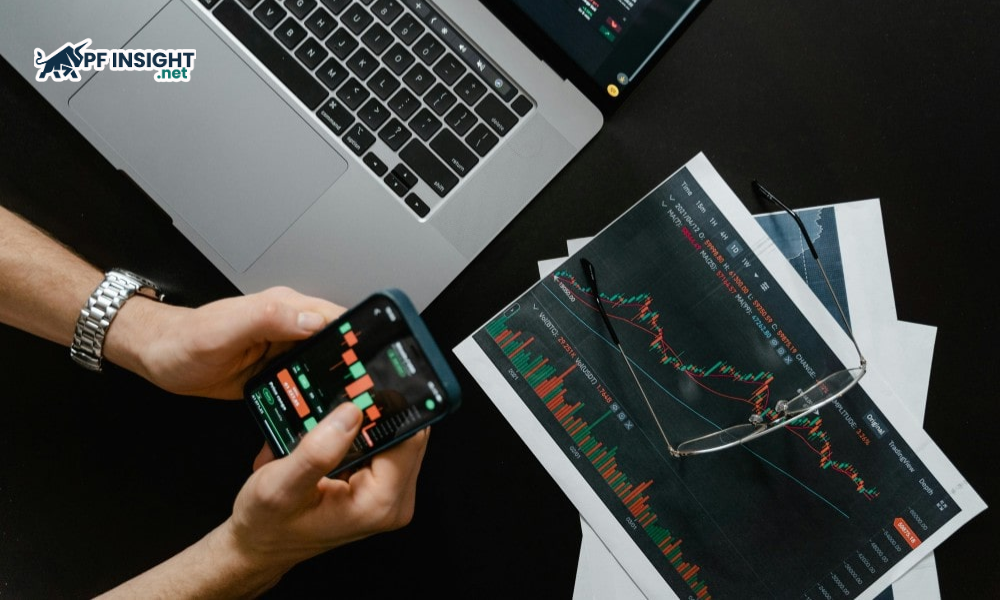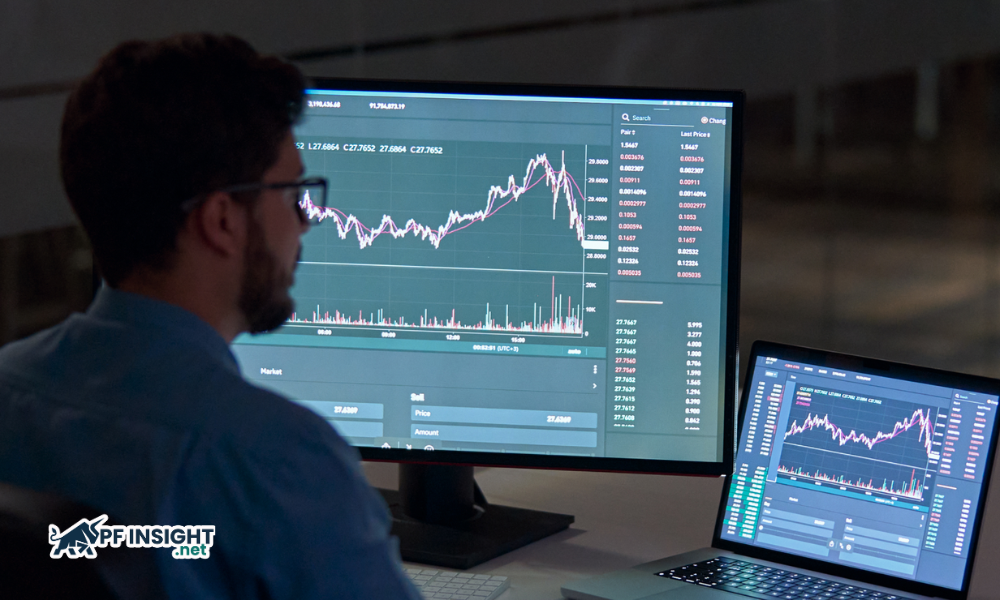As you may know, a trading platform is one of the most important factors that determines success in investing. With their unique combination of tools, features, and benefits, MT4 vs MT5 are widely regarded by traders as the two most popular and widely used platforms. However, for Prop Firm traders – who must adhere to strict rules, tight risk management, and specific performance targets – the decision between MT4 vs MT5 is not just a matter of personal preference. Today’s article from Pfinsight.net will give you an in-depth overview of these two platforms and guide you in choosing the one that best fits your trading needs.
Basic Knowledge of MT4 vs MT5
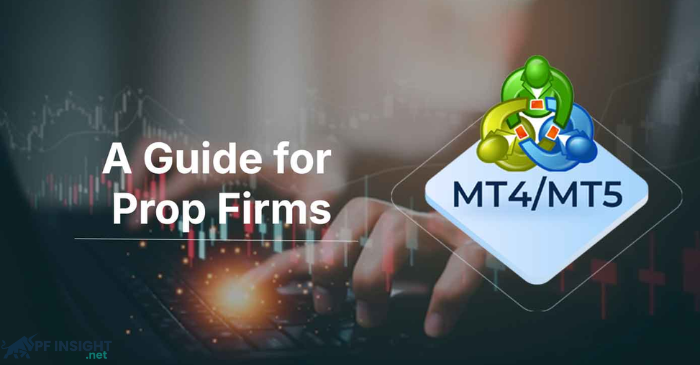
Prop Firm traders can choose the platform that best aligns with their goals and trading style by understanding the key differences between MetaTrader 4 (MT4) and MetaTrader 5 (MT5). While both platforms are well-known in the trading community, MT4 vs MT5 cater to different approaches and preferences.
What is MT4?
MT4 was specifically designed for forex trading and was first released in 2005. This platform has remained a favorite among forex traders for many years thanks to its reliable performance and simple, user-friendly interface.
One of MT4’s biggest advantages is its lightweight design, which consumes fewer system resources – a key factor for Prop Firm traders aiming for consistency. With nine timeframes and 30 built-in indicators, MT4 offers essential market analysis tools without overwhelming beginners.
Another major benefit of MT4 is its extensive library of community-created tools. For Prop Firm traders who rely on automated strategies during the evaluation phase, these resources are invaluable.
Thanks to the user-friendly MQL4 programming language, traders can create or modify automated systems without needing to learn complex code. While MT5 offers more advanced features and broader market access, MT4 remains an excellent choice for traders focused primarily on forex.
What is MT5?
Launched in 2010, MT5 was developed as an upgraded version of MT4 to serve not only forex but also other markets such as stocks, futures, options, and commodities. For Prop Firm traders looking to diversify their portfolios during challenging market conditions, MT5 is a powerful option.
With 38 built-in indicators and 21 timeframes, MT5 offers a more comprehensive set of market analysis tools. These features are particularly useful during the evaluation phase, allowing traders to stand out and hit profit targets with the help of in-depth analysis.
MT5’s order management system supports six types of pending orders compared to MT4’s four, giving traders greater flexibility in managing complex strategies and strict drawdown limits.
Additionally, MT5 uses the object-oriented MQL5 programming language, enabling the development of more advanced automated trading systems. This is especially valuable for Prop Firm traders looking to implement complex strategies and optimize risk management.
Both MT4 vs MT5 perform well in simulated trading setups – a core part of Prop Firm challenges. Demo accounts can sometimes offer virtual balances of $100,000 or more, allowing traders to test strategies in realistic conditions before transitioning to funded accounts.
MT4 vs MT5 – Key Differences
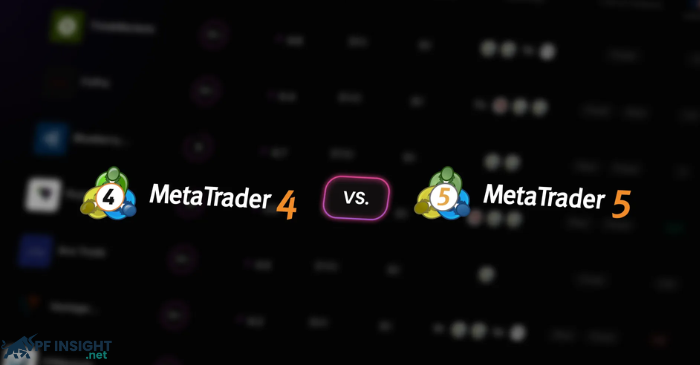
To choose the right platform for Prop Firm trading, traders must understand the unique features of MT4 vs MT5. The tools, market coverage, and order management capabilities of each platform can significantly influence performance during challenging evaluation phases.
Trading features for Prop Firm markets
The trading features of MT4 vs MT5 differ in ways that can directly impact success in Prop Firm challenges. One of the biggest differences lies in asset variety. While MT5 supports forex, stocks, indices, commodities, and cryptocurrencies, MT4 focuses mainly on forex and CFDs. This means MT5 allows traders to diversify their portfolios – a crucial factor for risk control or meeting challenge requirements.
MT5 also offers more advanced technical analysis tools, greater precision, and deeper insights during evaluations. With six types of pending orders compared to MT4’s four, MT5 gives traders greater control over order execution and risk management.
Another unique feature of MT5 is its built-in economic calendar – something MT4 does not have – allowing traders to stay updated on market-moving events without relying on external sources.
Automation and Programming: MQL4 vs MQL5
Another key distinction between MT4 vs MT5 is automation capability. While MT4’s MQL4 language provides basic functionality, MT5’s MQL5 allows for more complex, object-oriented programming. This makes MQL5 better suited for creating advanced and scalable automated trading systems.
With multi-threading support, MQL5 runs faster and more efficiently – up to 20 times faster than MQL4 programs. MT5 also enables multi-currency backtesting with cloud processing, compared to MT4’s single – currency backtesting.
MT5 can manage up to 512 indicator buffers versus MT4’s 32, allowing for more complex and detailed technical analysis.
Speed and system requirements
Another difference between MT4 vs MT5 is system performance. MT4 runs on a 32-bit single – thread architecture, while MT5 uses a modern 64-bit multi-thread design optimized for multi-core processors.
MT5 typically executes trades in 50 – 70 ms compared to MT4’s 150 – 200 ms, and its backtesting speed is two to three times faster. MT5’s use of OpenGL for rendering reduces computational demand, improving scalability and resource efficiency.
In terms of server infrastructure, MT5 distributes workloads across multiple servers for improved stability during peak trading hours, while MT4 uses a single dedicated server.
Which platform to choose for Prop Trading?

The decision between MT4 vs MT5 for Prop Firm trading primarily depends on your trading goals, trading style, and the resources you need to succeed. Each platform has its own unique strengths, and the ideal choice will be the one that best matches your specific trading approach.
Depending on your trading style, you can choose MT4 vs MT5
Selecting the right platform largely comes down to your trading strategy. Thanks to its ease of use and extensive library of Expert Advisors (EAs), MT4 is an excellent choice if your primary focus is forex trading. With an estimated 80% share of the forex market, MT4 has become the preferred option for traders who prioritize forex-based strategies. Its simple-to-learn MQL4 programming language also makes it easier to develop straightforward automated systems.
MT5, on the other hand, is the go-to platform for those who want to diversify their portfolios across multiple asset classes, including stocks, commodities, and futures. This platform is ideal for multi-asset trading thanks to its sophisticated features and wide asset support. In 2023 alone, MT5 users traded over $1 trillion across various asset types, highlighting its value for traders with diversified portfolios.
MT4 remains a popular choice for beginners due to its user-friendly interface and abundance of learning resources. However, with its advanced backtesting capabilities and multi-asset compatibility, MT5 is often favored by experienced traders or those managing large, complex portfolios. While MT4 can only backtest one currency pair at a time, MT5’s multi-threaded backtesting allows strategies to be tested across multiple currency pairs simultaneously.
Evaluating how each platform meets the technical demands of Prop Firm trading is just as important after you’ve considered your trading style.
Platform requirements for Prop Firm challenges
The choice between MT4 vs MT5 is heavily influenced by the technical requirements of Prop Firm challenges, which go beyond just trading style. The platform you choose must meet certain criteria, including hardware compatibility and efficient backtesting capabilities.
For traders with older hardware, MT4 is a solid choice because it is a lightweight platform. Even low-performance computers can handle trading activities with ease thanks to MT4’s reliable performance. On the other hand, MT5’s 64-bit optimization allows it to run faster and handle larger datasets more effectively. This is particularly valuable for traders who need to monitor multiple positions or process large volumes of market data during Prop Firm evaluations.
Both MT4 vs MT5 offer virtual-funded accounts and customizable trading rules for Prop Firm platforms such as For Traders. When it comes to forex-focused challenges, MT4 excels due to its reliability and simplicity, minimizing technical issues during the evaluation phase. Since MT5 supports stocks, futures, and options in addition to forex, it is better suited for multi-asset challenges. Its advanced risk management tools and built-in economic calendar provide extra advantages for complex trading scenarios.
Additional features in MT5 for Prop Firm traders
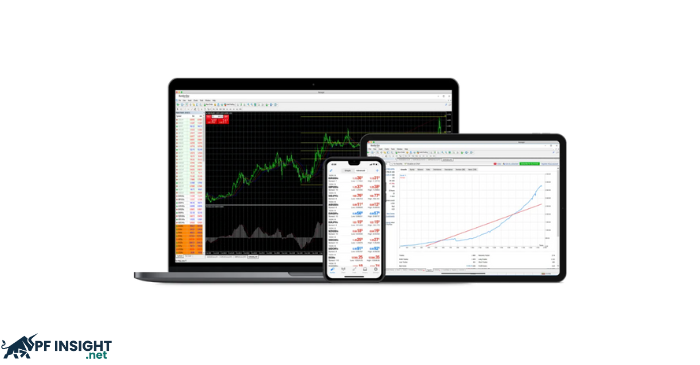
MT5 also introduces features such as netting, which allows multiple positions to be consolidated into a single one. This is especially useful for managing risk in diversified portfolios. Furthermore, traders gain extra flexibility when managing multiple challenge accounts thanks to MT5’s ability to transfer funds between accounts.
Both MT4 vs MT5 offer hedging capabilities and demo trading accounts. However, MT5 takes it a step further with advanced Market Depth (DOM) features, offering deeper insights into market liquidity – a critical factor when managing larger position sizes in Prop Firm trading.
Automation and programming considerations
For automated strategies, the choice of programming language is equally important. While MT5’s MQL5 is more powerful, it is less widely known and has fewer pre-built resources available. MQL4 for MT4, on the other hand, is easier to use and comes with a vast library of existing tools. MT4 is the better choice if you want immediate access to tested and proven tools. MT5 is the superior option if your goal is to develop complex, specialized trading solutions from the ground up.
Conclusion
This comprehensive guide has explored the differences between MT4 vs MT5 for Prop Firm traders, covering everything from trading features and automation to system performance and technical requirements. By understanding the strengths and limitations of MT4 vs MT5, you can make an informed choice that supports your trading style, meets challenge requirements, and maximizes your chances of success. Stay tuned to Pfinsight.net for more expert insights – and good luck in your Prop Firm journey!

